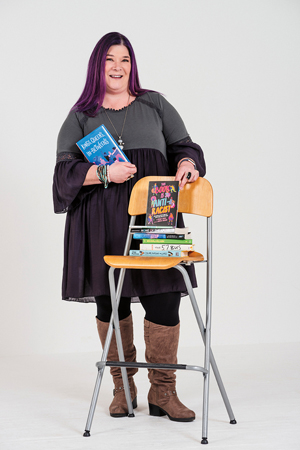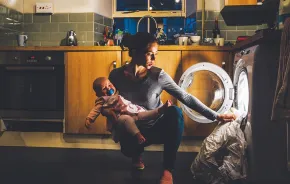
For Lisa Keating of Tacoma, the road from activist to elected official was flanked by doors. Thousands of them. As a candidate for Tacoma Public Schools Board of Directors Position 1, Keating, together with daughter Stella, husband Dimitri and other supporters, knocked on over 9,000 doors around Tacoma in 2019.
The strategy worked. Early election results had Keating behind by a slim margin before she pulled ahead of 30-year incumbent Debbie Winskill to win by 1,723 votes.
Ringing thousands of doorbells was exhausting, she says. But one by one, doors opened. Before entering local politics, Keating was an advocate, first for Stella, then for LGBTQ youth throughout the Puget Sound region. Her work as an LGBTQ advocate includes founding community outreach organization My Purple Umbrella, anti-bullying school program Allies in Action and the Queerest Book Club Ever. For her work, Keating was named a Gold Star Community Partner by Tacoma Public Schools and received the Pride Foundation’s 2016 Ruby Award.
As an educator and activist, Keating worked with people who knew her story and had sought out her guidance on safety, inclusion and equity issues. As a candidate, she was operating in an entirely different world, she says.
“I wasn’t running to represent LGBTQ youth — I was running to represent all students, families and taxpayers. I had to demonstrate my capacity to stand for all students in a nonpartisan citywide position,” she says.
Meeting voters face-to-face and learning about their problems, questions and concerns was invaluable to her growth as a leader, says Keating. “As time-consuming and challenging as doorbelling was, it was the most beneficial thing I did — whether I won or not. Having meaningful conversations with people who have very different beliefs was an extraordinary experience.”
Keating was sworn into the six-year, volunteer position on December 12, 2019. Just a few months in, she feels more at home as an elected official than she did as a candidate. “As a first-time candidate, I had to prove that I had the right to run, the intelligence to run, and that I had put in my time,” she says. “I did not expect to be faced with so much bias and criticism, and I’ve never had to work so hard to prove that I’m a capable, intelligent individual.”
She also proved that it’s possible to broaden your reach as a leader without losing your sense of purpose. “After building a body of work from a place of authenticity, learning to perform as a candidate while maintaining my authenticity as a candidate was quite challenging. I’m grateful I was pushed as far as I was.”
Who is your personal hero?
Stella, my kid.
What do you wish people understood about your work?
What I really wish is that people would be more willing to learn something different from what they understand to be true; to be open to people having different experiences and validate those experiences.
What’s one small action readers can take in their own lives to make positive change happen?
When you hear harmful or derogatory comments about transgender, nonbinary and queer people, speak up. Learning to say, “I’m not comfortable with those statements” is an easy way to approach harmful language.
What daily habit or small routine is most important to you?
Daily check-ins with my family about what we’re experiencing each day are very important to me.
Do you have any advice for today’s parents who want to raise and support their kids to achieve big ambitions?
Talk about and practice the importance of resiliency; address failure as a tried experiment; and expose children to as many diverse experiences and people as possible.
Favorite read of the past year?
Any ideas for great ways to get kids involved in volunteering?
Have conversations with children about their experiences and ask what changes they’d like to see. Don’t assume a child’s capability based on their age; there’s this assumption that especially younger children don’t have the ability to understand complex issues. There is a way to talk to children about issues such as homelessness, race, racism, equity and forms of oppression — they really have brilliant ideas.











